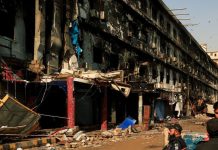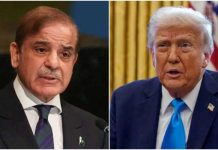By Uzma Zafar
ISLAMABAD: President Dr Arif Alvi Thursday said that the whole world appreciates Pakistan’s effective policy against COVID-19 and the government’s strategy of smart lockdown proved very effective in preventing the spread of COVID-19 pandemic in the country.
“How Pakistan handled the pandemic is a different story from the rest of the world. The government’s strategy of smart lockdown and caring for the poor segments did wonders,” he said while addressing the virtual meeting of the Association of Pakistani Physicians of Northern Europe. The president said in India, about 90,000 cases of the coronavirus being reported on daily basis.
During the coronavirus, mosques in Pakistan were kept opened with all the standard operating procedures in place, he added.
President Alvi observed that the institutions in Pakistan had been working effectively, and referred to functioning of the National Command and Operation Center (NCOC) during the COVID-19 pandemic.
He said its contact and tracing strategy proved very effective in tackling the infection so it was very important for the rest of the world. The president also stressed upon focusing of preventive care than curative arrangements costing much expenditures.
The countries like Pakistan did not have much resources so they should go for preventive measures which also emerged during the pandemic, he added.
The president said during 2005 in a dental forum in China, he had highlighted the significance of distance learning and the world had now realized its importance in the prevailing COVID-19 pandemic.He stressed that the developed countries must share their knowledge and experiences in health and education sectors with the rest of the world. The president also enumerated various initiatives and campaigns launched by the government to overcome different diseases like polio and hepatitis, which posed a challenge. He also appreciated the services of Association of Pakistani Physicians of Northern Europe.
Earlier, President Dr Arif Alvi on Thursday said the prevalence of drugs in the society, particularly in educational institutions, was a major source of concern and underscored the need for taking effective measures by the federal and provincial governments and the relevant agencies to make the institutions safe and secure from drug abuse.
He expressed these views while chairing a meeting on drug challenges in the educational institutions here at the Aiwan-e-Sadr, a press release issued by the President’s Media Office said. The meeting was briefed by the Ministry of Narcotics Control about the prevalence of drugs in the country and its adverse impact on the young generation. The ministry highlighted the measures taken for prevention of drugs in the country.
The provincial governors and the Azad Jammu & Kashmir (AJK) president apprised the meeting about the challenge of drug abuse and suggested measures to eradicate it.
The meeting was attended by AJK President Masood Khan, Federal Minister for Narcotics Control Senator Muhammad Azam Khan Swati, Minister of State for Narcotics Control Shehryar Afridi, all the provincial governors, including Gilgit Baltistan Governor Raja Jalal Hussain Maqpoon, Special Assistant to the PM on National Health Services Dr Faisal Sultan and Anti-Narcotics Force (ANF) Director General Maj Gen Muhammad Arif Malik. President Alvi stressed upon the governors, who are also the chancellors of universities, to take the lead role in addressing the alarming challenge of drug addiction so as to save the young generation from the menace of drugs.
He urged the Ulema and media to play their role in creating awareness about the impacts of drug addiction. The meeting emphasized the need for making coordinated efforts by the federal and provincial governments, and agencies concerned to tackle the menace of drug trafficking.
It also underscored the need to further strengthen the existing anti-narcotics laws with the consensus of federal and provincial governments. It was agreed to convene a meeting of all the vice chancellors of the country to devise a strategy to make the educational institutions free from all social evils, particularly the drug abuse.




